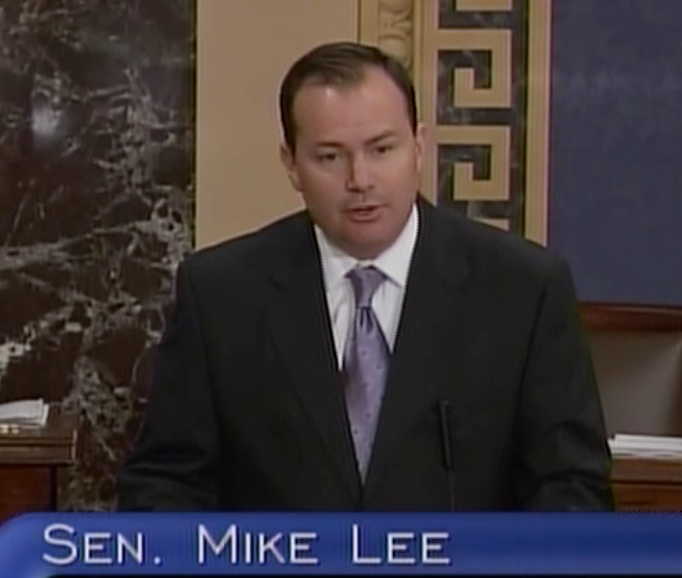Day Lee Briefing -- 5/26/2011
May 26, 2011
Senator Lee, Republican Colleagues Call on Administration to Produce Budget
May 26, 2011
Day Lee Briefing -- 5/25/2011
May 25, 2011
Day Lee Briefing -- 5/24/2011
May 24, 2011
Day Lee Briefing -- 5/23/2011
May 23, 2011
Day Lee Briefing -- 5/20/2011
May 20, 2011
Today’s Agenda
Today Senator Lee is in Utah visiting with constituents.
From the Senator’s Desk
It has now been 60 days since Obama authorized military action in Libya. This passage is from a letter I signed with Sens. Paul, DeMint, Johnson, Coburn, and Cornyn, which we sent to President Obama:
Congress received your report pursuant to section 4(a)(1) of the War Powers Resolution on March 21, 2011. Friday is the final day of the statutory sixty-day period for you to terminate the use of the United States Armed Forces in Libya under the War Powers Resolution. As recently as last week your Administration indicated use of the United States Armed Forces will continue indefinitely. Therefore, we are writing to ask whether you intend to comply with the requirements of the War Powers Resolution. We await your response. –Mike Lee
#2nd Opinion
President Obama called for Israelis and Palestinians to return to the peace process using 1967 borders as a starting point. I agree with Prime Minister Netanyahu that this move would leave Israel in a militarily indefensible position.
Around the Water Cooler
Oil shale development: “This legislation will bring down the cost of gas and give American energy producers the certainty they need”
Armed Forces Day: Tomorrow, May 21, is Armed Forces Day. I would like to thank all the brave men and women in the armed forces who have kept us safe over the years.
Day Lee Briefing -- 5/19/2011
May 19, 2011
Lee Condemns President's Statement on Israel's borders
May 19, 2011
WASHINGTON – Today, Senator Mike Lee criticized President Obama’s call for Israel to return to its pre-1967 borders. He released the following statement:
"I condemn in the strongest possible terms the President's irresponsible suggestion that Israel return to its pre-1967 borders. I agree with Prime Minister Benjamin Netanyahu that this move would leave Israel in a militarily indefensible position.”
Floor Statement on Goodwin Liu May 19, 2011
May 19, 2011

Lee Opposes Appellate Court Nomination
May 19, 2011
WASHINGTON – Today, Senator Mike Lee expressed his profound objection to the nomination of Goodwin Liu as a Judge on the U.S. Court of Appeals for the Ninth Circuit. In a speech on the Senate floor, Senator Lee articulated two primary reasons for opposing the nomination.
“First, I am truly dismayed by the lack of judgment displayed in Professor Liu’s 2006 testimony regarding the confirmation of Samuel Alito as an Associate Justice of the Supreme Court,” said Lee, a member of the Senate Judiciary Committee and former Assistant U.S. Attorney.
During the confirmation hearing of Justice Alito, Liu made controversial and inflammatory remarks misrepresenting Justice Alito’s judicial record.
“His comments about Justice Alito were offensive not simply because they were unhelpful in his confirmation process, but because they were a misleading and unwarranted personal attack on a dedicated public servant.”
“Professor Liu’s treatment of Justice Alito, and his last minute and incomplete handling of the concerns raised by his remarks, lead me to believe that he lacks the judgment and discretion to be confirmed to a life-tenured position in the judiciary.”
Senator Lee also explained that “the judicial philosophy espoused by Professor Liu is fundamentally inconsistent with the judicial mandate to be a neutral arbiter of the Constitution and to uphold the rule of law.”
“Throughout the course of numerous speeches, articles, and books, Professor Liu has championed a philosophy that in my judgment is incompatible with faithfully discharging the duties of an appellate court judge in our constitutional republic,” he added.
Lee concluded: “Professor Liu’s appalling treatment of Justice Alito leaves grave doubt in my mind as to whether he possesses the requisite judgment to serve as a life-tenured judge. And I have come to the conclusion that Professor Liu’s extreme judicial philosophy is simply incompatible with the proper role of a judge in our constitutional republic. For these reasons, as well as those articulated by many of my colleagues, I am compelled to oppose this nomination.”
